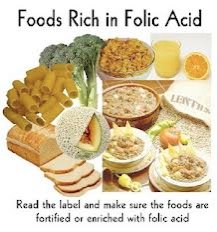
Having a baby is one of the most important times in a woman’s life, and be it the first or the third child, the devotion of an expectant mother to their child is a bond that transcends the tangible. If you are expecting or merely trying to conceive, then folic acid (vitamin B9), or folate as it is sometimes referred to, is important to prevent substantial birth defects to the brain and spine amongst other benefits. Doctors advocate at least 400 mcg of folic acid each day, which may sound a lot, however with these pregnancy super-foods you’ll be well on your way to your daily dose.
Next time you’re in the supermarket, hone in on the green fresh produce. Not only do many of these items contain folic acid but fiber, vital vitamins and minerals too. Leafy green vegetables such as kale, lettuce and spinach are brimming with nourishment, spinach in particular yielding 218 mcg in only 60 grams, and it is packed with vitamin C.
 Green is the theme for the next three folate boosters: Asparagus, a popular accompaniment to any meal, imparts nearly 80 mcg in every 60 gram serving, making this is one treat you or your baby simply cannot resist. Broccoli contains vitamin C, iron and calcium too with 104 mcg in 175 grams. Avocado is renowned as one of the most fatty fresh produce items, however the omega-3 fatty acids found in avocado are amazing for both you and a growing child’s brain. One medium avocado supplies 90 mcg, a great excuse to whip up some guacamole and get dipping.
Green is the theme for the next three folate boosters: Asparagus, a popular accompaniment to any meal, imparts nearly 80 mcg in every 60 gram serving, making this is one treat you or your baby simply cannot resist. Broccoli contains vitamin C, iron and calcium too with 104 mcg in 175 grams. Avocado is renowned as one of the most fatty fresh produce items, however the omega-3 fatty acids found in avocado are amazing for both you and a growing child’s brain. One medium avocado supplies 90 mcg, a great excuse to whip up some guacamole and get dipping.
Pulses, such as lentils and kidney beans are easy to incorporate into recipes and are high in protein, fiber and iron. 75 grams of cooked lentils provides 180 mcg, nearly half of the recommended daily dose, and can be incorporated into curries, casseroles and soups without the soaking essential for other pulses. Kidney beans need a good soaking before use, however they contain 115 mcg in each 30 grams, and the tinned, pre-soaked variety does not contain less folic acid. Seeds, in particular sunflower seeds, contain 82 mcg in just 28 grams, and can be scattered on baking fish, salads or by themselves as a filling nibble between meals.
Breakfast is the most important meal of the day, and by choosing fortified breads one can provide that all important folic acid too, with 60 mcg in each slice. Some breakfast cereals, like multi-grain cheerios, boast 400 mcg or more in each serving, making the morning meal a quick and easy affair for the expecting. Enjoying orange juice along with this repast adds a further 74 mcg per glass, and an orange as a snack garnishes one’s daily intake with up to a further 55 mcg. Tomato juice, containing 48 mcg per glass, is another folate-full juice alternative and like orange juice is brimming with vitamin C, which aids iron uptake. Iron is also important during pregnancy for the baby, the placenta and the extra blood your body will produce.






